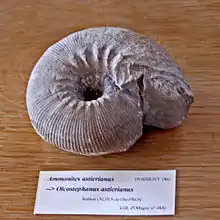Olcostephanus
Olcostephanus is an extinct ammonoid cephalopod genus belonging to the family Olcostephanidae. These fast-moving nektonic carnivores[1] lived during the Cretaceous, from the upper Valanginian to the lower Hauterivian age.[2][1][3]
| Olcostephanus | |
|---|---|
 | |
| Fossil of Olcostephanus astierianus from France, on display at Galerie de paléontologie et d'anatomie comparée in Paris | |
| Scientific classification | |
| Domain: | Eukaryota |
| Kingdom: | Animalia |
| Phylum: | Mollusca |
| Class: | Cephalopoda |
| Subclass: | †Ammonoidea |
| Order: | †Ammonitida |
| Family: | †Olcostephanidae |
| Genus: | †Olcostephanus Neumayr, 1875 |
| Synonyms | |
| |
Species[1]
- Olcostephanus astierianus (d'Orbigny, 1840)
- Olcostephanus atherstoni Sharpe, 1856
- Olcostephanus bakeri Imlay, 1937
- Olcostephanus bosei Riedel, 1938
- Olcostephanus delicatecostatus Haas, 1960
- Olcostephanus detonii Rodighiero 1919
- Olcostephanus filifer Imlay, 1937
- Olcostephanus laticosta Gerth, 1925
- Olcostephanus paucicostatus Imlay, 1937
- Olcostephanus pecki Imlay, 1960
- Olcostephanus popenoei Imlay, 1960
- Olcostephanus prorsiradiatus Imlay, 1937
- Olcostephanus quadriradiatus Imlay, 1938
- Olcostephanus sanlazarensis Imlay, 1937
Distribution
Fossils of species within this genus have been found in the Cretaceous sediments of Antarctica, Argentina, Austria, Bulgaria, Chile, Colombia (Macanal Formation, Eastern Ranges),[4] Czech Republic, France, Hungary, Italy, Mexico, Morocco, Poland, Portugal, Romania, Slovakia, South Africa, Spain, Russia, United States, as well as in the Jurassic of Argentina.[1]
References
- The Paleobiology Database
- Sepkoski, Jack Sepkoski's Online Genus Database – Cephalopoda
- Wright C. W. with J.H. Callomon and M.K. Howarth (1996), Mollusca 4 Revised, Cretaceous Ammonoidea, vol. 4, in Treatise on Invertebrate Paleontology, Part L (Roger L. Kaesler et al. eds.), Boulder, Colorado: The Geological Society of America & Lawrence, Kansas: University of Kansas Press, p.46.
- Piraquive et al., 2011, p.204
Bibliography
- Piraquive, Alejandro; Juan Sebastián Díaz; Tomas Cuéllar; Germán Pardo, and Andreas Kammer. 2011. Reactivación Neógena de estructuras de rift del Cretácico Temprano asociadas con la Falla de Chámeza, Pajarito, Boyacá (Colombia): evidencias tectónicas y bioestratigráficas. Geología Colombiana 36. 197-216. Accessed 2017-08-04.
- Wright C.W. with J.H. Callomon and M.K. Howarth (1996). "Mollusca 4 Revised: Cretaceous Ammonoidea". In Roger L. Kaesler (ed.). Treatise on Invertebrate Paleontology Part L. Vol. 4. Boulder, Colorado and Lawrence, Kansas: The Geological Society of America & University of Kansas Press. p. 46 – via Internet Archive.
This article is issued from Wikipedia. The text is licensed under Creative Commons - Attribution - Sharealike. Additional terms may apply for the media files.